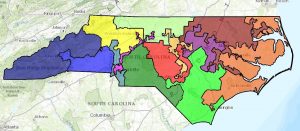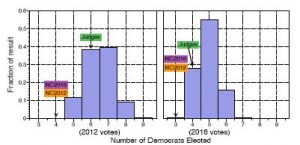Post updated March 6 and 7 — see the end.
Justice Allison Riggs maintains a 734-vote lead over Republican rival Jefferson Griffin after more than 5.5 million ballots were cast and two recounts. Griffin is seeking to have 65,000 ballots thrown out. Today I will answer a question no one has asked: What is the probability he will win the election if the votes are thrown out? The answer is 2/1000.
A reversal may sound extremely likely, but the square root of 65,000 is 255. Suppose we have 5.5 million ping pong balls in a swimming pool. Exactly half have R for Riggs and half have G for Griffin. We then draw 65,000 ping pong balls out. What is the probability that the outcome of the election is changed? If we count balls with R as +1 and balls with G as -1 then the election result is change if the sum of the numbers which we call S is > 734, since this is the net number of votes lost by Riggs.
In the jargon of probability these balls are drawn without replacement, but given the large number of balls, this differs very little from drawing with replacement, which is just flipping 65000 coins and counting +1 for heads and -1 tails. On the average the net change in the outcome is 0, or in the terminology of probability the expected value of S = 0. Of course the resulting sum is unlikely to be exactly 0. In elementary probability class we learn how to compute the size of the typical deviation of S from 0, which is the standard deviation. In the case of 65000 independent random variables that are +1 with probability ½ and -1 with probability ½ the standard deviation is the square root of 65,000 or 255.
The central limit theorem allows us to estimate the probability the number of votes lost by Riggs, S > 734. This value is 734/255 = 2.878 standard deviations above the mean. Using my calculator function normalcdf I can calculate using the normal approximation that the probability the outcome of the election does not change is 0.997998, or the chances that the election outcome will change is less than 2 out of 1000 or 0.2%.
Taking this reasoning further. Let us suppose that throwing out the 65,000 votes results in a loss of 1530 votes for Riggs. This result is 6 standard deviations above the mean. Using the calculator again gives a probability of 0.00000001 that this occurs. Thus if throwing out the votes results in a change of more than 1530 votes in the outcome then we are absolutely certain that the votes chosen to be challenged were not chosen at random. They are a biased sample of ineligible voters that contains more Democrats than one would. This is hardly surprising since the Republican party made the list, but this observation provides one more reason that the votes should not be thrown out.
One reader questioned the assumption of indpendence of party and registration status. One practical consideration is that if we don’t do that we can’t compute anything. In ecological terms, independence is a null model. Once we reject it then we ask why. One explanation is that democrats are more incompetent at filling out the registration form, but it seems more likely that the Repubicans who made the list were more likely to put Demicrats on it.
————————————-
As I have thought about the situation more I think that is a convincing argument for not throwing out these votes can be based on statistical data. If the list consisted of say 3000 voters all of whom were Democrats, it would be ridiculous to throw out these votes which would hand to election to Griffin.
I don’t have access to the list of 65,000 names and their parties but if for instance it consisted of 30,000 Democrats, 20,000 Independents and 15,000 Republicans this would show a bias since the fraction of registered voters of the three types are 32% D, 38% I, 30% R. Information quoted in Riggs’ emails already points to an unexpectedly large number of college students on the list.
. I suspect that at the end of the process when the case reaches the NC Supreme Court it will be decided on party lines and Griffin will be elected by the same group that decided partisan gerrymandering is legal. As the actions of the legislature in the years that they have had a veto proof majority indicate, Republicans are not swayed by arguments about what is unfair. But I guess the large fraction of them who believe that Trump won the 2020 election indicates they don’t believe in statistics either.





